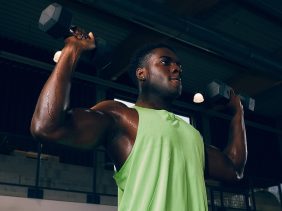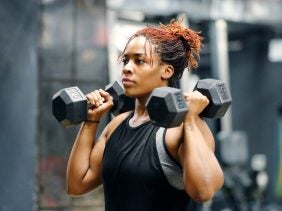Building Muscles on a Vegan Diet: Our Top Tips and Tricks
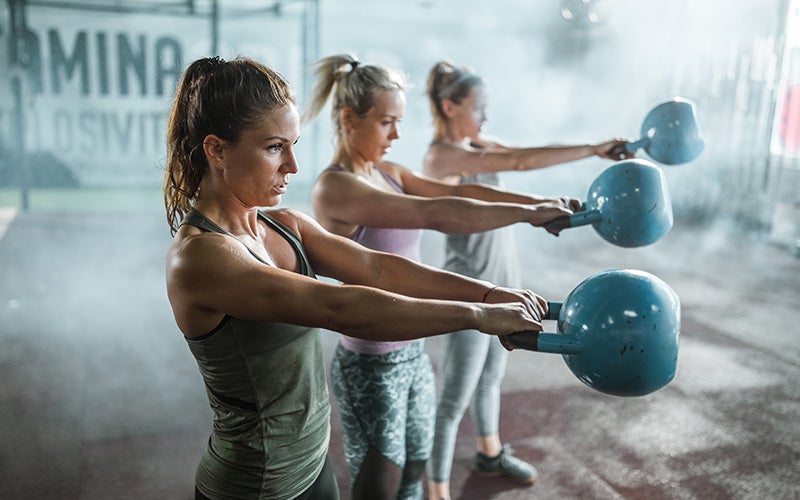 ©Skynesher
©Skynesher
Have you heard that vegetarian or vegan muscle building is impossible? It’s actually no problem at all! Let us explain how you can build muscle without animal protein and support your journey with our range of vegan fitness products.
How does muscle development work?
To develop muscles effectively, there are three important factors, whatever your diet may be. First, your exercise program must be targeted at gaining muscle mass. This will send a signal to your body and trigger muscle development.
Exercise isn’t the only factor that’s important though. Recovery is just as important, because your body actually only starts to develop muscle mass when it’s resting. That’s why we recommend one or two days rest between each workout.
That doesn’t mean you should just lay on the couch for two days. An active recovery will be better at stimulating muscle growth than an inactive one. For example, use a foam roller after each workout to activate blood circulation and reduce muscle soreness. Other activities like biking or yoga are ideal for the recovery period.
Finally, the last important factor for effective muscle development is the right nutrients (carbohydrates, fats, and proteins).
Proteins are crucial for increasing muscle mass. They can come from animal-based or plant-based protein sources, and each has its own set of pros and cons. Let’s walk through them together.
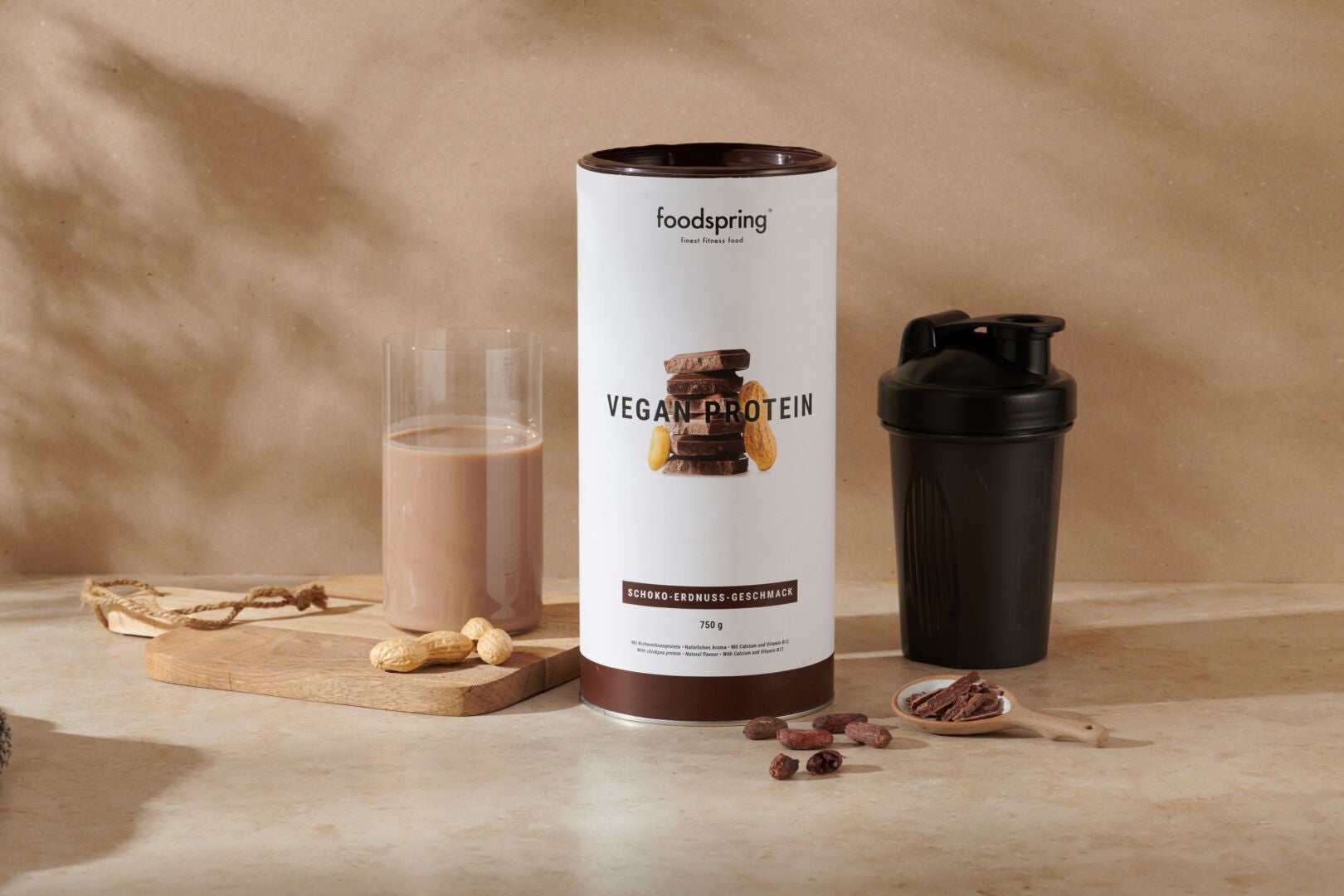
Are you on a dairy-free diet and want to increase your protein intake? Our Vegan Protein is quick and easy to make into shakes or recipes to support your vegan muscle building goals. It’s composed of 100% plant protein, and it’s gluten-free and lactose-free — everything you need, and nothing you don’t!
What’s the difference between animal and plant protein?
We used to differentiate between “good” and “bad” proteins the same way we would with good and bad fats. The higher the biological value of protein, the better it was considered to be.
Meat and other animal proteins have a high biological value, because these foods all contain the 9 essential amino acids that the human body does not produce on its own. For that reason alone, animal protein is a great source of nutrition.
Vegetable proteins, on the other hand, often do not contain all the essential amino acids, and must therefore be combined with other protein sources. This is the source of the myth that plant-based or vegan muscle building was impossible.
Scientists are also intrigued by this question. In a study, 24 participants were asked to drink a protein shake in the first 30 minutes after training over a period of 8 weeks. The participants were divided into two groups. The first group was asked to drink a classic whey shake, while the second was asked to drink a vegetable protein shake. At the end of the 8 weeks, scientists found no difference in overall muscle development between the two groups. Basically, as long as you provide your body with the essential amino acids it needs to build muscle, it doesn’t matter which protein you choose.
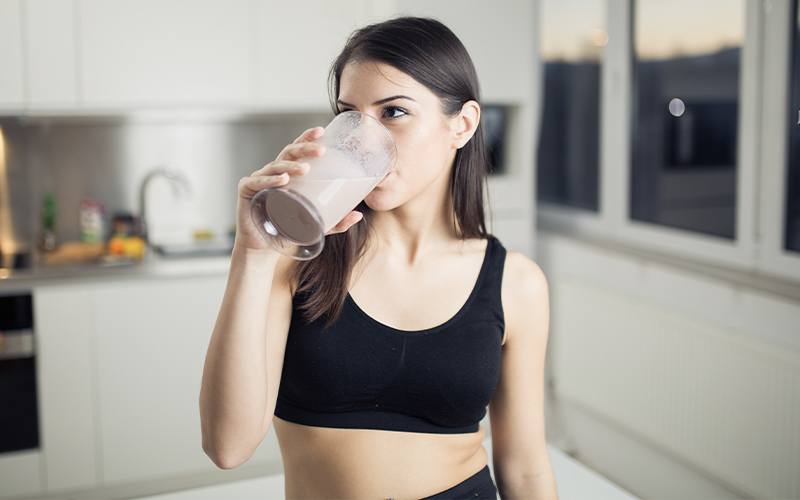
Long story short: Vegan muscle building is easier than you thought! If you’re still worried about what to eat between meals, try any of our delicious vegan muscle building snacks to support your journey.
The best sources of plant protein for vegan muscle building
Here is a non-exhaustive list of plant proteins that contain all the essential amino acids you’ll need for effective vegan muscle development:
- White Chia Seeds
- Hemp seeds
- Black sesame seeds
- Quinoa
- Peas
- Amaranth seeds
- Wholegrain rice
- Algae
- Spirulina
- Chlorella
- Moringa leaves and leaf powder
These foods are also rich in plant protein even though they don’t contain all the essential amino acids:
- Legumes (beans, lentils, etc.)
- Nuts and seeds
- Avocado
Don’t know where to start?
Guess what? We’re almost sure you’ve already got all the ingredients for a bunch of vegan muscle building recipes in your pantry. We’re about to show you how easy it is! With our vegan recipes, there’s nothing left to stand in your way.
Summary
- It is possible to build muscle with a vegan or vegetarian diet.
- Vegetable proteins also contain essential amino acids.
- As long as you provide your body with all the amino acids it needs, you can eat either vegetable or animal protein.
More healthy lifestyle facts from foodspring:
- 3 Meal Planning Tips for Vegan Athletes
- Grab Yourself Plant Power To Go with Our Vegan Protein Bar
- Our Best Vegan Baking Tips and Tricks – and 10 recipes!
- Plant Protein – The Best Vegan Protein Sources
- Get Ready: Your 7-day eating vegan challenge starts now
Sources for this article
We at foodspring use only high-quality sources, including peer-reviewed studies, to support the facts within our articles. Read our editorial policy to learn more about how we fact-check and keep our content accurate, reliable, and trustworthy.
- ¹ Joy JM, Lowery RP, Wilson JM et al., The effects of 8 weeks of whey or rice protein supplementation on body composition and exercise performance, 2013, Nutrition Journal































